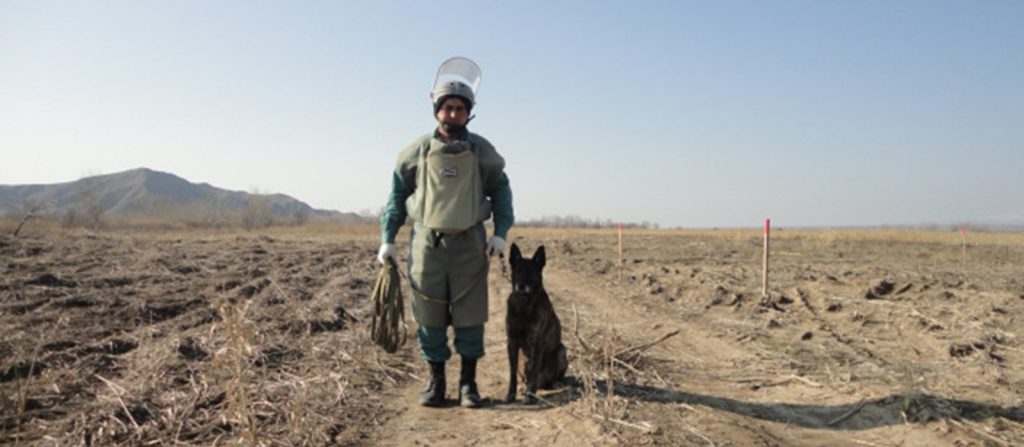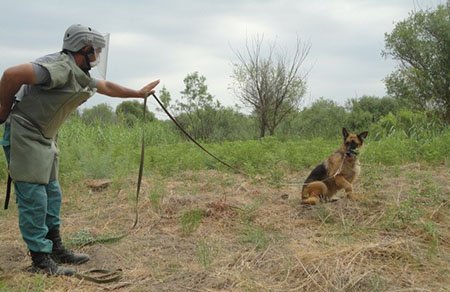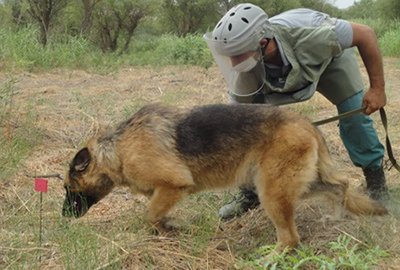Mine Detection Dog Partnership Program
The Marshall Legacy Institute

Long after bullets stop flying and soldiers return home, the deadly remains of wars linger in the soil as landmines and dangerous explosives. Men, women, and children living in war-torn countries cannot farm their land, walk to school, or play in playgrounds due to fear of these hidden killers. By sniffing out the explosive odors in landmines, the Marshall Legacy Institute’s Mine Detection Dogs are able to save thousands of lives and limbs by returning the land back to the people for its safe and productive use.
- MLI’s dogs have searched over 50 million square meters of land (nearly 10,000 football fields!)
- ¾ of MLI’s dogs have been sponsored by caring, American citizens including schoolchildren.
- All of MLI’s dogs have been certified under International Mine Action Standards.
- MLI has never had a dog injured or killed during operations.
- MDD & EDD teams search land at a 30x faster rate than manual deminers.
- MLI’s dogs can locate metal AND plastic landmines, making them more effective than metal detectors.
- MLI’s dogs undergo 3-5 month training courses where they learn to detect explosive odors.
- MDDs commonly work for 6-8 years in the field before retiring to a loving and caring home.
Leonardo DRS is proud to support the Marshall Legacy Institute and their pursuit of alleviating suffering and promoting hope, growth and stability in war-torn countries. Therefore Leonardo DRS has announced the sponsorship of a Mine Detection Dog to aid MLI in their mission.
See below to learn more about MLI and the Mine Detection Dog Partnership Program.
Image Gallery
Images of the mine detection dogs in the field and being trained.
History

The Marshall Legacy Institute (MLI) was founded in 1997 with the mission to locate, secure, and apply skills and resources to alleviate suffering, restore hope, and create conditions that nurture stability in countries affected by conflict. For many years, MLI has developed Mine Action programs that work to combat the deadly legacy of landmines which can halt agricultural production, impede economic growth, slow the return of refugees, instill fear, and kill and maim innocent citizens on a daily basis, injuring or killing at least one person every 40 minutes. MLI’s longest running program is the Mine Detection Dog Partnership Program (MDDPP). Through the MDDPP, MLI provides highly-trained mine detection dogs (MDDs) and explosive detection dogs (EDDs) to mine affected countries and trains local handlers. The bond between dog and handler is essential to the effectiveness of our MDD and EDD teams in the field. MLI’s partners in Azerbaijan shared this story of the relationship between MDD Rocket and his handler:
“The relationship between Rocket and handler Vahid is remarkable. Their usual daily routine starts early morning, when Vahid take his dog out for a run, and a little pre-work play. Every day, Vahid and Rocket work in boxes to maintain the search capability. In the minefield, they are the best team ever. Vahid has such a great confidence in Rocket, and that trust motivates other mine detection dog teams to work harder and build such a relationship. Vahid loves his dog so much and takes good care of him, and Rocket returns that love by being his best friend.”
Since MDDPP’s inception in 2001, MLI has donated 235 landmine detection dogs (MDDs) and 15 explosive detection dogs (EDDs) to build the capacity of local mine clearance efforts in the world’s most severely mine-contaminated countries including Afghanistan, Angola, Armenia, Azerbaijan, Bosnia Herzegovina, Eritrea, Iraq, Iraqi Kurdistan, Lebanon, Nicaragua, Sri Lanka, and Thailand. Landmine clearance saves countless lives and allows for land to be returned to communities for agriculture, grazing, construction, and development.

On November 9, 2020, a tripartite peace agreement between Armenia, Azerbaijan, and Russia ended the 44-day Second Karabakh War between Armenia and Azerbaijan. In this agreement, Azerbaijan gained control of the Nagorno-Karabakh region, which is heavily contaminated with landmines as a result of decades of conflict. The recent mine action assessment mission that the United Nations Development Program (UNDP) and the United Nations Mine Action Service (UNMAS) undertook jointly in the newly liberated territories concluded that Azerbaijan is facing “a new, large and complex explosive ordinance threat”. Idris Ismayilov, who leads the Nagorno-Karabakh demining operation at the Azerbaijan National Agency for Mine Action (ANAMA), stated in November that it will likely take up to 10 years to completely demine the region. To date, MLI has donated 36 MDDs and 4 EDDs to Azerbaijan that have helped ANAMA search over 29.5 million square meters of mine-contaminated land. ANAMA has requested MLI’s support (and additional dogs) in the massive effort to demine Nagorno-Karabakh and other mine-affected areas. MLI’s MDDs will increase ANAMA’s capacity to safely and effectively clear mine-affected land and enable displaced people to return home and live free without the fear of mines.
Community Success
Mine Detection Dogs (MDDs) and Explosive Detection Dogs (EDDs) in Azerbaijan:
- In 2020 alone, MDD and EDD teams located 130 unexploded ordnance (UXO) devices.
- MDD and EDD teams have searched over 29.5 million square meters of mine-contaminated land.
- 5 MDDs and 4 EDDs are currently active in Azerbaijan.
